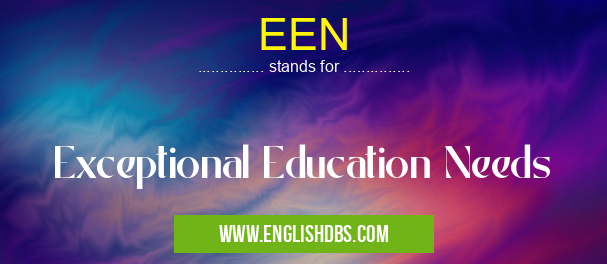What does EEN mean in EDUCATIONAL
Exceptional education needs (EEN) is a term used to describe the additional educational requirements of a student who may have learning difficulties or require extra support in managing their individual educational needs. These students may have autism, physical disabilities, and/or intellectual disabilities that prevent them from gaining the same level of benefit from traditional learning experiences as their peers. A range of specialist services can be accessed by the school or student if an EEN assessment has been carried out and it is established that extra support is required.

EEN meaning in Educational in Community
EEN mostly used in an acronym Educational in Category Community that means Exceptional Education Needs
Shorthand: EEN,
Full Form: Exceptional Education Needs
For more information of "Exceptional Education Needs", see the section below.
» Community » Educational
Full Meaning of EEN
The full meaning of EEN is “Exceptional Education Needs”. This term refers to those students who require additional help to access their education due to learning difficulties or other issues such as physical disability, attention deficit disorder, mental illness or emotional trauma. Such students often struggle with a standard curriculum and require different approaches and resources tailored specifically for their individual needs. Specialists such as psychologists, psychiatrists and speech-language pathologists can assess such conditions in order to determine how best they can be supported through further intervention and support for both school work and personal growth.
Essential Questions and Answers on Exceptional Education Needs in "COMMUNITY»EDUCATIONAL"
What is Exceptional Education Needs (EEN)?
Exceptional Education Needs (EEN) refers to students who have special educational needs due to physical, sensory, emotional, medical and/or learning disability. This type of education requires an individual approach tailored to meet the unique needs of each student. It often involves a range of services including teaching methods and interventions focused on helping the student learn effectively and reach their full potential.
Who is eligible for EEN?
Any student with special educational needs as identified by an assessment or evaluation can be eligible for EEN services. The exact eligibility criteria depend on the specific situation and are determined by each school district according to their policies.
How do I identify if my child has an EEN?
An appropriate evaluation should be conducted in order to determine whether your child has EEN. This generally involves educational testing, psychological assessment, medical evaluation, physical examination, speech and language evaluation from a qualified professional. Depending on the situation, other assessments may also be necessary before determining eligibility for EEN services.
How do I access EEN services?
Once it has been determined that your child qualifies for EEN services, you will need to contact your local school district to start the process of accessing these services. The school district will provide information about available resources and assistance programs that may help in meeting the educational needs of your child.
What kind of support does EEN provide?
Depending on each individual case, various types of support may be provided through an Exceptional Education Needs program such as specialized instruction, therapies (speech therapy or occupational therapy), assistive technology devices or software programs, adaptive equipment or physical supports. Additionally social and emotional supports such as counseling may also be incorporated into the program plan.
What is an Individualized Education Plan (IEP)?
An Individualized Education Plan (IEP) is a document developed by a team consisting of knowledgeable professionals such as teachers and specialists with input from parents that outlines appropriate goals and strategies designed specifically for one particular student in order to meet their exceptional education needs. It contains information about specific accommodations needed in order for the student to successfully participate in classrooms activities and make progress towards reaching their goals.
How often are IEPs updated?
IEPs should generally be reviewed at least annually or more frequently if needed based on changes in the students’ educational needs or progress towards reaching their goals outlined within it. During these review sessions any adjustments required should be discussed and agreed upon by all parties involved.
Are parental involvement important when it comes to providing supports under a EEN program?
Yes parental involvement is very important throughout out process when it comes providing exceptional education support for children as they can offer valuable insight regarding their child’s strengths , interests , challenges faced etc . Parental input helps ensure that goals laid out in IEP are relevant , practical , attainable , measurable , well-defined & Student centered.
Final Words:
Understanding exceptional education needs (EENs) enables teachers, schools, parents and other professionals involved in the care of these children to access the right resources in order to ensure that they receive all the necessary educational support they need. It also facilitates collaboration between all relevant stakeholders in order to provide an optimal learning environment for those with exceptional educational requirements – one that goes beyond creating positive academic outcomes but also promotes inclusion regardless of ability or disability. With this kind of holistic approach towards meeting these valuable members of our community’s diverse needs we can ensure everyone receives the chance at success they deserve.
EEN also stands for: |
|
| All stands for EEN |
